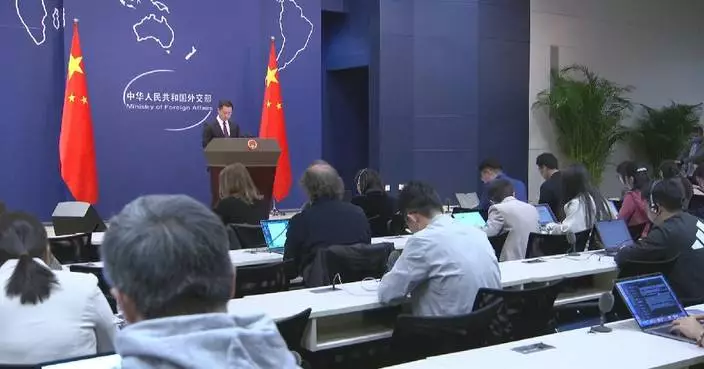The coffee industry has now become a new engine driving economic growth in Yanji, a county-level city in the Yanbian Korean Autonomous Prefecture of northeast China's Jilin Province, thanks to the supportive policies launched by the local government in recent years.
Yanji, with a permanent population of less than 700,000, has seen the number of coffee shops in it steadily increase in recent years. Some coffee practitioners have incorporated local specialties and folk elements into their coffee products and packaging, continuously creating unique coffee products and developing a distinctive coffee culture.
"We often launch innovative coffee products in the form of 'coffee+' combinations, such as Yanbian Asian pear coffee, rice wine coffee, dandelion root tea, and balloon flower root tea, among various other fashionable and folk products that reflect the unique characteristics of Yanbian," said Xu Guangyu, a staff member from a local cafe.
In order to make "coffee" a more prominent city label, Yanji has kept supporting the development of its coffee industry. By leveraging the growing trend in cultural and tourism integration, the city is creating new pathways for this development. It encourages the establishment of coffee shops around tourist attractions, fostering coordinated growth between the coffee industry and local scenic spots.
Accordingly, the local government has managed to accelerate administrative reforms and optimize the business environment for business startups in the city.
"We've launched in an in-depth way a reform of the administrative review and approval procedure, enabling the applicants for business startups to personally complete the filing of the application documentation 'only once', with sustained promotion of whole-process electronized processing of application documentations, reducing the duration of time for completing business startup registration to just one working day," said He Chunyan, deputy director of the Administrative Approval Office of Yanji Municipal Market Supervision Administration.
In the past two years, the number of coffee shops in Yanji has grown from over 500 to more than 1,000.
The rapid development of the coffee industry has attracted many young people to return or stay in their hometowns. Yanji has introduced a package of youth talent policies to offer up to 31 preferential treatments such as subsidies for housing purchases, rentals, and car purchases to attract young people.
"Next, we will comprehensively refine and update the youth talent policies, introducing an upgrade 2.0 edition of the talent policies. This aims to attract more young people to Yanji for employment and business startup, thereby injecting strong momentum into the development of various undertakings in the city," said Liu Qiwen, deputy director of the Yanji Municipal Human Resources and Social Security Bureau.

Coffee industry becomes new engine driving economic growth in northeast China city
The China Pavilion at the 2025 Osaka Expo, which will open to the public by next Sunday, welcomed media visits on Monday, sharing sneak peeks highlighting the integration of Chinese philosophy and modern technologies.
As one of the largest foreign self-built facilities at the Osaka Expo, the China Pavilion has adopted the theme "Building a Community of Life for Man and Nature – Future Society of Green Development."
The pavilion consists of three components themed "past, contemporary, and future" respectively, featuring an integration of traditional Chinese philosophic norms and the modern sustainable development principles.
The first section of "Tian Ren He Yi," or the "Harmony Between Mankind and Nature," features traditional Chinese culture and history. The exhibited installations include a digital "waterfall of characters" demonstrating the Chinese writing system's evolution, with the introduction of Jieqi, or 24 solar terms on China's traditional lunisolar calendar that demonstrates the understanding of ancient Chinese people to the nature.
The highlights of the section are exhibitions of ancient Chinese archeological sites, including Sanxingdui in southwest China's Sichuan Province, Liangzhu in east China's Zhejiang Province, and Yinxu in central China's Henan Province, dating back to three to five thousand years ago. Replicas of cultural relics from the three sites are presented in the pavilion, among them are the earliest water conservancy system from the Liangzhu archeological site, and the mysterious Bronze Divine Tree from Sanxingdui.
"This is a replica of the Bronze Divine Tree made in the Shang Dynasty (1600BC-1046BC). It is among the earliest and largest single-piece bronze artifacts discovered in the world so far. Other exhibits here include the bronze standing figure with an animal-shaped hat, and the bronze mask. With a touch on the screen, we can learn about details of the cultural relics by examining their 3D models in an immersive way. And we also provide trilingual introductions for visitors from around the world to know about the relics," said a docent of the China Pavilion.
The second section, named after China's contemporary green development principle of preserving "Lucid Waters and Lush Mountains," presents descriptions of China's natural and cultural landscapes, ecological systems, and achievements in urban management.
Exhibits in the second section include introductions of China's national parks, and the two mega-sized ecological projects, the Dujiangyan Water Conservancy Project, which was initially built over two thousand years ago and which has been maintained and upgraded since then, and the Three-North Shelterbelt Forest Program, one of world's largest afforestation projects.
In the third section of future developments, a model of China's Jiaolong submersible and exhibits of China's aerospace science projects share with the viewers China's spirit of exploration of the unknown.

China Pavilion of 2025 Osaka Expo opens to media for sneak peeks



















































